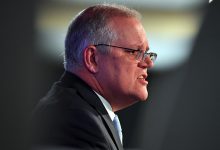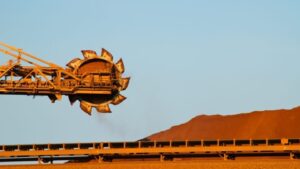Prime Minister Scott Morrison has again suggested that gas is the only technology available to firm supplies of wind and solar generation, saying that batteries have yet to be built at sufficient scale.
The comments came during an address to the National Press Club on Thursday ahead of the federal budget, announcing a new $1.3 billion ‘Modern Manufacturing Initiative’. They appear to contradict a range of expert analysis about the capabilities of battery technologies, including the Integrated System Plan prepared by AEMO as a blueprint for the future energy system.
Asked about the role of gas in the energy market, Morrison said that he was focused on the development of new gas resources, as he did not think battery storage would be in a position to deliver sufficient firming capacity.
“Gas is a way of supporting renewable investment, renewable energy sources. When you look at the per unit cost of electricity that comes from all the various sources, whether it’s solar, wind or gas or others, you need to compare it on a reliability measure,” Morrison told the National Press Club.
“And to make the record investment that we’ve had in renewables work better for the system, it needs the firming capacity. Now, we know that batteries are not at that scale yet. They’re not at that scale yet.”
“And gas is – as I said, it selects itself because there is not another resource that can so quickly peak to support the renewables,” Morrison added.
The prime minister said that his views on gas had been based on advice provided by member of the National Covid-19 Commission, Andrew Liveris, who also happens to sit on the board of the world’s oil and gas producer, Saudi Aramco. Morrison has previously dismissed the Tesla big battery in South Australia to the “big banana” in NSW. See: Does Scott Morrison have any idea what a big battery can actually do?
Morrison’s comments are in contrast with the outgoing head of the Australian Energy Market Operator, Audrey Zibelman, who told the Global Smart Energy Summit on Wednesday that the rapidly falling costs of battery storage will play a major factor on the ongoing development of the energy system.
Zibelman suggested it will be the cost of battery storage that will likely be the determinative factor of the role gas will play, as cheaper batteries could see gas pushed out of the market for firming capacity.
“It really is going to be dependent on what happens with batteries and storage, and what happens with the price of gas and what kind of programs the government might want to put in place to help manage the price of gas,” Zibelman told the Global Smart Energy Summit.
“What we’re seeing is, and it was highlighted in the Commonwealth Technology Roadmap, is how do we get the price of storage down and I think incentives around that make a lot of sense.”
“[AEMO’s Integrated System Plan] shows that gas will remain a significant portion of the power system going into the future. How big that is really depends on what happens with battery storage what happens to storage technologies,” Zibelman added.
AEMO’s Integrated System Plan found that batteries are expected to be the cheaper option compared to gas for new dispatchable generation capacity, with virtually all of the scenarios modelled by AEMO find that no new gas generators are needed to meet future energy needs.
Responding to the Morrison manufacturing speech, which briefly mentioned “clean energy” but with no details, Labor leader Anthony Albanese said the government should be focusing on boosting manufacturing in clean energy industries based on the resources abundant in Australia.
“We have everything that goes into a battery. We have lithium and all of those rare earths, the second largest deposits of rare earths in the world,” Albanese said. “We should be using that to produce batteries, to produce solar panels, to produce more things here.”
“We should be making sure that we are more self-reliant in the future because it is about creating jobs, but it is also about creating a future for this country.”
Earlier in the day, Morrison sought to admonish New South Wales energy minister Matt Kean, for comments about the future of gas, suggesting that based on economics that gas “as not part of the mix” for future energy investments.
“Those people arguing for coal, for nuclear, for gas, they’re actually arguing for more expensive, dirtier forms of energy,” Kean told a meeting of the Liberal party-aligned Coalition for Conservation.
Responding to the comments made by the state Liberal party minister, Morrison told 2GB radio that Kean’s comments were a “bit out of step”‘ with the wider views of the NSW Berejeklian government.
“If you’re not for gas, you’re not for manufacturing jobs,” Morrison said. “And so I’m afraid the minister is a bit out of step with his own government and their own policy, his premier, and indeed the deal he struck with the federal government.”
During his address to the National Press Club, Morrison announced the $1.3 billion ‘Modern Manufacturing Initiative’, which will provide grant funding to support manufacturers in priority areas.
“Recycling and Clean Energy” has been listed as one of six priority areas to share in the funding, but minimal detail is currently available as to what this funding may be used for, with the Modern Manufacturing Initiative not expected to commence until next year.










